Posted by: Jo Allen, President

Jo Allen, ’80, is the eighth president of Meredith College, a top-tier nationally ranked institution and one of the largest private colleges for women in the U.S. A national advocate for higher education, she is the first alumna to lead the 128-year-old institution.
In this blog post, President Allen explains that fostering a growth mindset is integral to the strengths-based education you’ll find at Meredith – and why it matters.
“I’ll never get this right.” I remember saying that when I was about 12 years old, trying to learn how to sew a skirt. While my mother was an excellent seamstress, for me the sewing instructions and the chaos in my mind just never came together. The idea of the most simple instruction, “put right sides together,” led to paralyzing confusion: Does this mean the correct side of the fabric (the outside versus the inside of the fabric?) or does it mean the right front side and the right back side? As you are wearing it or as you look at it?
To my mother’s glee, I quickly gave up sewing, deciding I would do better to save my allowance for that new skirt I wanted. To this day, I can sew on a button and hem a skirt or pair of pants, but I can’t sew anything wearable. Part of the reason, I am sure, is that I never had the confidence to believe I could sew. And I never had the confidence because I never had a small victory that built my confidence. You see, the skirt I tried to sew was really elaborate – lots of flowy layers and uneven hems, gathered in a rather exotic display of movement (or at least that is what the pattern promised). To complicate matters, I had selected a silky, multi-colored fabric (ok – it was loud and gaudy – it was the 1970s after all!) that made it almost impossible to keep the fabric from sliding off the sewing machine or to align right sides or anything else about it.
Looking back, I now see that I never developed a growth mindset about sewing – the belief that with some hard work, proper strategies and good teaching, I could learn to sew. Instead, I had what psychologist Carol Dweck calls a “fixed mindset,” meaning I was convinced that because I did not already have this skill that I would never have it. Sewing was, in my way of thinking, beyond my comprehension and capability. Consequently, my failure reinforced my certainty of failure. And I was right.
In college and in life beyond, developing a growth mindset is critical to learning and to becoming stronger. It means that whatever comes our way, we can adopt the stance that even if we don’t master the concept, activity, or skill, we can certainly become better at it. And that stance can develop into certainty that whatever life throws our way, we can work to gain some perspective on our ability to understand and benefit from the experience.
For this reason, even Meredith’s emphasis on building strengths based on what you are good at doing (rather than fixating on your weaknesses) nonetheless requires you to take some courses you may not want to take or don’t believe you have a knack for learning.
We want to encourage you to explore and develop that growth mindset – the practice of trying something new or hard to see if and how your knowledge and skills can evolve. After all, nobody starts out life being good at thermonuclear physics. It is a subject people have to learn, and while some may have the abstract and mathematical thinking proclivities that make the topic more accessible, even they have to learn its basics and escalated lessons in order to master the subject.
Just wanting to be positive and develop a growth mindset is a step in the right direction. But some specific strategies are even more helpful. At its heart, a growth mindset depends on knowing your strengths and using them as a positive source of inspiration for improvement. It is looking at a subject or activity or problem and saying, “I believe that even if I have to take small steps, I can use my strengths to attain or improve my thinking or mastery here.”
One of the lessons of a strengths-based college experience is that a series of strategies and high-quality teaching can help you enhance the development of a growth mindset. At Meredith we believe this mindset is critical to helping you try new experiences, learn new subjects, and grow in ways that will astound you. Let us show you more.
Sign up for our blog and get tips to help you write a strong college application essay. You’ll also receive valuable information every week to help you with your college search, including how to tell if a school is a good fit, how to pay for college, and more!
Share This Page
Office of Admissions
1st Floor, Johnson Hall
1-800-MEREDITH
(919) 760-8581
(919) 760-2348
admissions@meredith.edu
PRINCETON REVIEW
U.S. NEWS
NICHE
3800 Hillsborough Street Raleigh, NC 27607-5298 | (919) 760-8600 Fax: (919) 760-8330 | © 2024 All Rights Reserved.